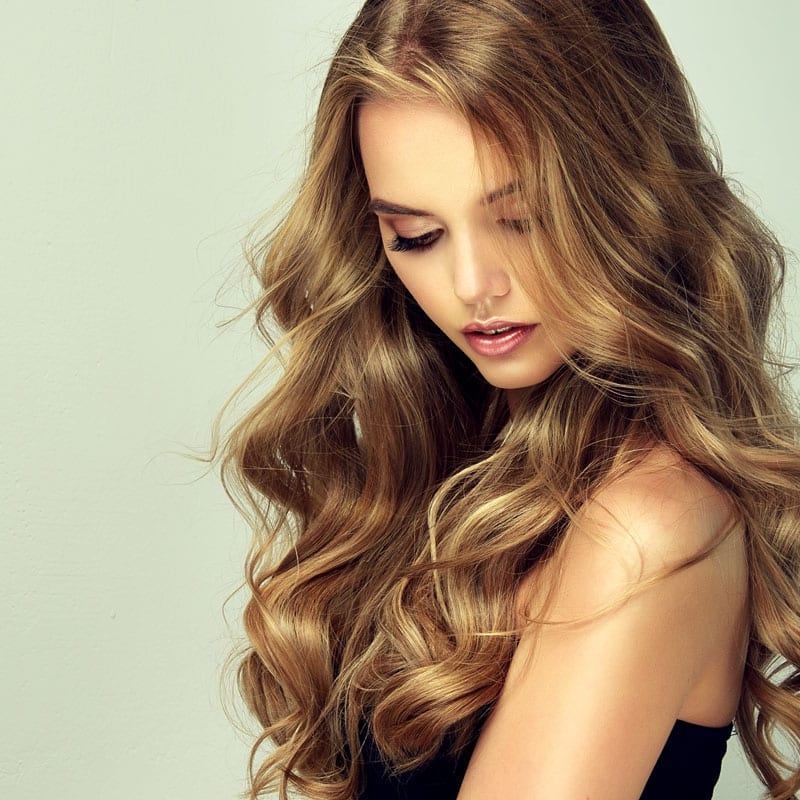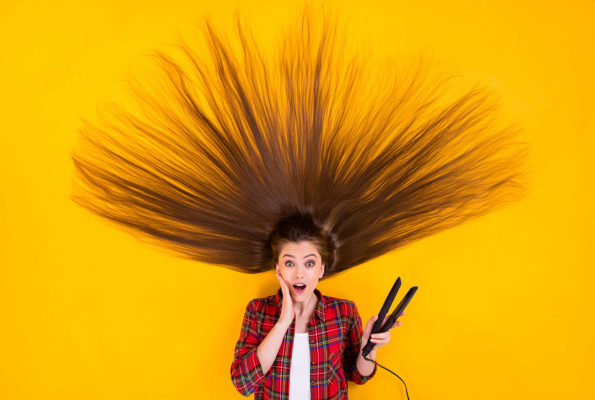How to Manage and Care for Thick Hair
Many people desire thick hair, but dense hair and broad strands pose unique care and styling challenges. Discover why hair thickness varies and learn to manage and style thick hair. Learn about how to choose the best shampoo for thick hair that is straight, wavy, curly or coily and conditioning, care and styling products. This guide also includes tips on increasing hair thickness by reducing breakage and supporting growth.

The best shampoo for thick hair varies depending on the texture and type of hair you have, but sulfate-free formulas are a good choice for thick hair. Natural oils are necessary to condition and protect hair from environmental stress and everyday damage.
Conditioners restore lost moisture and nourish strands. Hair products for thick hair such as deep conditioners, hair masques and leave-in conditioners provide supplemental care. Select the best products for thick hair by factoring in hair texture, type and concerns such as color treatment, chemical processing or damage.
Thick hair may be more manageable when you have it cut every 12 to 16 weeks. At every other appointment, you may want to remove bulk by having hair layered or thinned. Controlling the thickness of hair reduces its weight and shortens drying time.

The best shampoo for thick hair eliminates dirt and controls oil levels without eliminating every trace of natural oil. Many hair care experts and stylists recommend hydrating or moisturizing hair products for thick hair.
Getting layers or having hair thinned are two ways to reduce thickness. Haircuts should emphasize the natural body of thick hair and break up the appearance of a uniform length and color. Dimensional highlights also bring out the dimensions of thick hair.
Layered styles should flatter your face and give your hair bounce and movement. You may want to think twice about cutting thick hair very short. Short thick hair is often difficult to care for and takes a long time to grow out. Strike a balance between length and thickness to keep hair manageable.

If the outer cuticle of hair is lifted in a humid environment, external moisture causes strands to swell, resulting in frizz. Dry hair completely with a combination of air drying and blow drying and consider using anti-frizz hair products for thick hair.

Condition hair with a formula that locks in moisture with minimal build up. If your hair is dry, apply a hair masque once a week or every three shampoos. Deep condition dry, thick hair at least twice a month.
Increase the thickness of hair with thicker fuller hair shampoo, conditioner, and styling products that create the appearance of thicker hair. Do an occasional clarifying cleanse if you use thickening products and watch out for the drying effects of some volumizing formulas. Hair growth formulas gradually increase hair thickness.

Growing thicker hair calls for hair products for thick hair and gentle care methods. Use the best shampoo for thick hair of your type and texture. You can get a short-term boost from thickening or volumizing shampoo, conditioner and styling products. You can also support growth by using less damaging styling practices and optimizing your diet for healthy hair.

Omega fatty acids support healthy hair. These healthy fats are present in fish, nuts, seeds and plant oils. Protein is also necessary to support hair health and growth. Lean sources include eggs, fish, poultry, meat and yogurt. Vegetarians should eat beans, nuts and seeds to obtain this important building block of thick, healthy hair.
Vitamins are also essential to overall health and the condition of hair. The B vitamin Biotin is particularly beneficial for hair and is present in eggs and beans as well as supplements. Dark, leafy greens and colorful fruits and veggies are also rich sources of antioxidants and vitamins.

The best shampoo for thick hair does not contain harsh sulfate-based cleansers. Sodium lauryl sulfate and ammonium laureth sulfate strip away natural oils. Frequent cleansing also prevents oils from reaching the lower half of thick strands, which may be prone to dryness regardless of hair texture.
Conditioners for thick hair should distribute moisture and protect the full length of strands from damage. Some formulas repair damage caused by chemical processing or heat styling. Most thick hair benefits from hydrating formulas. Using concentrated conditioner makes it possible to care for thick, long hair with less product, which leads to less build up over time.
Some of the best hair products for thick hair include the right deep conditioner, hair masque and leave-in conditioner. Keep strands hydrated from roots to ends by using a deep conditioning treatment or hair masque formulated for the unique needs of your hair.

Thick hair takes longer to dry. The best shampoo for thick hair reduces buildup and excessive oil that slow drying. Limit heat damage by allowing hair to air dry for at least an hour before blow drying. Once hair is about 80% to 90% dry, blow dry the rest of the way on warm to cool heat. It may be helpful to separate hair with clips and work in sections. Try using an attachment designed for your hair texture such as a diffuser or smoothing nozzle.
Thick hair is perfect for braiding, and braids and buns are protective styles that limit damage caused by friction and heat styling. One of the easiest ways to control thick hair is to put it up in a top knot. Turn your head down and gather your hair up, twisting it into a knot. If your hair is very long, try turning the knot inside out and securing with strong hair pins or elastics.
Styling accessories are important hair products for thick hair. Hair ties and clips may stretch out or snap due to the heavy weight of thick hair. Use thick elastics or scrunchies to minimize damage from wearing ponytails or updos. You can still wear smaller combs and clips by doing a half-up, half-down style to reduce the load on accessories.

These two types of products have different effects and may be better suited for different hair textures and types. Most thickening products build up strands and may produce some lift at the roots. Volumizing products are all about creating lift and body, and may be better suited for hair that tends to fall flat or look limp.
While thickening and volumizing products tend to be effective, prolonged use may have undesirable side effects. Thickening products may leave behind buildup that requires the use of a clarifying shampoo at least once a week. If you use this type of product, be sure to take measures to prevent the lower portions of strands from becoming dry.
Many volumizing formulas contain forms of alcohol that sap moisture from strands. This does not apply to fatty alcohols such as cetearyl or benzyl alcohol, which promote product penetration. Use the best shampoo for thick hair and products that hydrate strands.

The hair products that you should avoid depend primarily on your hair texture. Formulas that are readily absorbed by hair with high porosity may not be as effective on low porosity strands. The best shampoo for thick hair will work on hair with any level of porosity. Your current level of hair thickness will determine whether you want to use thicker fuller hair shampoo.
When it comes to conditioning and caring for thick hair, some experts recommend exercising caution when using products that contain silicone. If you decide to use a silicone-based smoothing or styling product, look for a formula that contains water-soluble cyclomethicone or dimethicone copolyol.
Single-process hair color treatments are less damaging than double-processing. Whether you color all of your hair or maintain highlights to add depth and dimensionality to thick hair, use gentle formulas and hair products for thick hair that are safe for color-treated tresses.
Deep conditioners and masque treatments can repair some symptoms of damage. The best way to improve the condition of hair is to reduce the frequency of processing and heat styling. Hair that is less damaged looks and feels healthier.

How to Take Care of Thick Hair
Thick hair can be a blessing and a burden. On one hand, [Read More...]
The Absolute Best Hair Products for Thick Hair
If you have a head full of thick, heavy hair, it can [Read More...]
Thick Hair Products You Need To Try
Have you been blessed by the gods with a thick, full lion’s [Read More...]
Protect Your Hair (It Will Love You For It)
Using heat tools at high temperatures without first applying products to protect [Read More...]
Do You Need a Hair Thickening Shampoo?
If you have fine hair, you might be wondering whether or not [Read More...]






